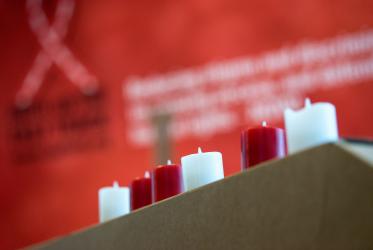A “High-Level Dialogue to Assess Progress on and Intensify Commitment To Scaling Up Diagnosis and Treatment of Paediatric HIV” was convened by His Eminence Peter Appiah Kodowo Cardinal Turkson, prefect of the Dicastery for the Promotion of Integral Human Development, PEPFAR, UNAIDS, WHO, and EGPAF in collaboration with Caritas Internationalis and the World Council of Churches-Ecumenical Advocacy Alliance (WCC-EAA) on 6-7 December at the Pontifical Academy of Sciences in Vatican City.
Participants addressed some of the bottlenecks that limit access to diagnostic products and programmes and discussed scale-up strategies that could help quickly identify HIV-exposed children and link them to testing and treatment services. Those gathered also assessed progress on achieving the commitments made in the November 2017 dialogue
Participants committed to a plan of action for the introduction and scale-up of optimized drugs, diagnostics and improved case-finding strategies for HIV which will be composed of a set of commitments in the same spirit as the Rome Action Plan 2017.
Diagnostic commitments focus on expanding effective case-finding strategies and overcoming challenges related to the scale-up of innovative point-of-care early infant diagnosis technology, which significantly increases the number of HIV-positive children who are diagnosed early and immediately initiated on treatment.
Treatment commitments targeted remaining gaps in the area of streamlining drug approval processes, financing accelerated pathways to develop and uptake better paediatric formulations as well as ensuring wide availability and uptake of optimal formulations.
In his opening remarks, Turkson put forth the rationale behind convening the dialogue. “Beyond offering words of welcome, I would like to take this opportunity to explain the purpose and the role of the Holy See in promoting such high-level dialogue,” he said. “Just a few days ago, we marked the 30th Observance of World AIDS Day – an occasion to mourn the premature deaths of millions of people to this syndrome of illnesses which always was preventable and now is treatable, including the deaths of more than 5 million children who have died of AIDS-related illnesses since the beginning of the epidemic.”
Turkson urged the participants to keep at the centre of their attention the people most affected by deep human needs. “Our examination of statistics, trends, barriers and solutions indeed will be crucial and necessary during these two days,” he said. “But let us also keep foremost in our hearts the human persons for whom we undertake such efforts.”
At the conclusion of the dialogue, Turkson thanked participants for their continuing commitment. “During your discussions, you shared a great deal of good news that has been generated by your previous analysis of the obstacles faced by children to gain access to affordable, accessible, and acceptable formulations of ‘child friendly’ anti-retroviral treatment that only could be possible through diagnosis of HIV infection as early as possible,” he said.
The WCC-EAA was part of the planning team for the dialogues and also for the accountability mechanism of the 2017 Paediatric HIV Action Plan.
“From a consultation in 2016 under the PEPFAR/UNAIDS Faith Initiative, the Vatican dialogues and related activities have been hosting and nurturing a thoughtful and meaningful dialogue over two years,” said Francesca Merico, coordinator of the WCC-EAA HIV Campaign. “We appreciate the collaborative and constructive spirit of this platform and hope it will be expanded to include other diseases that disproportionally affect children, such as TB which is killing many children every year, including children living with HIV.”









